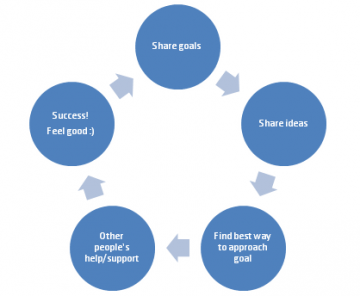Video Link: http://www.ted.com/talks/derek_sivers_keep_your_goals_to_yourself.html
I chose this TED talk because I found it very interesting- it is counterintuitive to the “togetherness” environment and energy of the D-Studio.
I disagree with this speaker. Sivers advocates that we should not tell other people about our goals. When we tell people about our goals, people congratulate us and have a “higher image of us”, and this makes us feel good. This good feeling as a result of the praise is, in Sivers’ opinion, what makes us less likely to achieve that goal, since we feel we have already done some work and are partway there. By extension, when we do not tell people our goals, we are discouraging the support and exchanging of ideas that is cultured in the D-Studio.
Although Sivers presents research stretching as far back as the 1920s that corroborate this claim, I cannot help but disagree.
I have had many personal experiences that speak to the effectiveness of telling somebody your goals. I think one really important emotion that Sivers discounts is accountability. When I tell somebody of my goals, I immediately feel the pressure to achieve it because I have already set up expectations for myself. The possibility of having to face my family and friends and to tell them that I did not succeed in doing what I had set out to do is a terrible feeling.
Naturally, we do not like to disappoint. Especially in a group setting, we do not like to feel bad when others have achieved their goal, but we have not. If this group accountability notion does not work, as Sivers claims, then why are weight loss programs effective? Barring the longevity of the weight loss, people in these programs successfully lose weight when in such a program because they are always checking up on each other as a group.
Another example of successful goal-sharing is working on projects. A specific example I am thinking of is working to create the best tablet computer. Say you have the goal to revolutionize tablet computers since the iPad. This can be seen as a personal goal or a work goal, which is great because it is not clear as to what type of goal Sivers is referring to. According to Sivers, we should not tell anybody about this goal if we want to succeed in building a revolutionary tablet computer. This has detrimental effects in 2 ways.
- We cannot exchange ideas and pick other people’s brains for different perspectives because we cannot share this goal.
- We cannot enlist other experts to be on board the development team because we cannot share this goal.
Clearly, one person is not capable of building a super tablet all by himself because he neither has all the “best” ideas fully formed, nor does he have the technical and non-technical skills to make this product succeed in the market.
So, I am not saying that we need to share all of our goals, but I am saying that it is helpful to have people to share your goals with and deliberate together on the different ways that a goal may be achieved. It may also be helpful if we hold ourselves accountable to those people whom we choose to share with. The result is a positive feedback loop. So, use your judgment, and share when you feel it will help you in reaching your goal!
